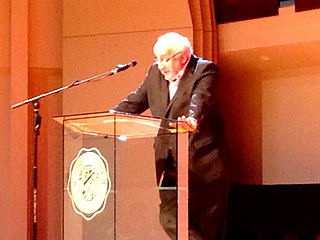A Quote by Emile Durkheim
A religion is a unified system of beliefs and practices relative to sacred things, that is to say, things set apart and forbidden-beliefs and practices which unite into one single moral community called a Church, all those who adhere to them.
Related Quotes
There is a place in this world for satire, but there is a time when satire ends and intolerance and bigotry towards religious beliefs of others begins. Religious beliefs are sacred to people and at all times should be respected and honored. As a civil rights activist of the past 40 years, I cannot support a show that disrespects those beliefs and practices.
People come to have different moral beliefs because they have different non-moral beliefs about relevant facts. People are disposed to believe whatever justifies the practices and institutions that benefit them. But I argue that not all moral differences can be explained away in such a fashion. Some of the most profound disagreements come from differences in priority assigned to values such as relationship and community on the one hand, and individual rights and personal autonomy for the individual, on the other hand.
A society whose members are united by the fact that they think in the same way in regard to the sacred world and its relations with the profane world, and by the fact that they translate these common ideas into common practices, is what is called a Church. In all history, we do not find a single religion without a Church.
When it comes to controlling human beings there is no better instrument than lies. Because, you see, humans live by beliefs. And beliefs can be manipulated. The power to manipulate beliefs is the only thing that counts ... Who knows what use they’ll make of you? Maybe you’ll help them to persuade people to buy things they don’t need, or hate things they know nothing about, or hold beliefs that make them easy to handle, or doubt the truths that might save them.
The Church has been and now is unalterably opposed to gambling in any form whatever. It is opposed to any game of chance, occupation, or so-called business, which takes money from the person who may be possessed of it without giving value received in return. It is opposed to all practices the tendency of which is to encourage the spirit of reckless speculation, and particularly to that which tends to degrade or weaken the high moral standard which the members of the Church, and our community at large, have always maintained
If we, who live outside asylums, act as if we lived in a fictitious world- that is to say, if we are consistent with our beliefs- we cannot adjust ourselves to actual conditions, and so fall into many avoidable semantic difficulties. But the so-called normal person practically never abides by his beliefs, and when his beliefs are building for him a fictitious world, he saves his neck by not abiding by them. A so-called "insane" person acts upon his beliefs, and so cannot adjust himself to a world which is quite different from his fancy.
Men live in a community in virtue of the things which they have in common; and communication is the way in which they come to possess things in common. What they must have in common in order to form a community or society are aims, beliefs, aspirations, knowledge - a common understanding - likemindedness as the sociologists say.
..Such practices and beliefs, which interfere with happiness, are neither inevitable nor necessary; they evolved by chance, as a result of random responses to accidental conditions. But once they become part of the norms and habits of a culture, people assume that this is how things must be; they come to believe they have no other options.




































